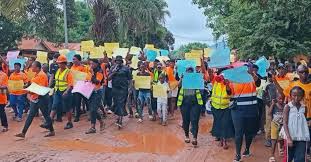By Lawrence Williams
The escalating dispute between Koidu Limited, a subsidiary of the Octea Group, and its workers has thrust Sierra Leone’s First Lady into the heart of a crisis that should not be about individual figures but rather the broader issue of systemic exploitation and national rights. As the impasse between the First Lady and the mining giant has dominated headlines, it has shifted the focus away from the decades-long human rights violations carried out by Koidu Limited.
Koidu Limited is the largest diamond mining company in Sierra Leone, generating millions in revenue, yet the country is still struggling with poverty, poor infrastructure, and socio-economic challenges. Meanwhile, its workers—many of whom toil in unsafe and unsanitary conditions—continue to demand basic rights: fair pay, clean drinking water, decent sanitation, and better working conditions.
Their requests are not radical. They are asking for their contracts, originally signed in dollars, to reflect the current exchange rate, instead of the outdated 2016 rate. They are demanding basic amenities that should already be provided to every worker, including clean water and decent sanitation facilities. And they are seeking compensation for overtime hours, a reasonable request that any corporation should accommodate.
Despite these straightforward demands, Koidu Limited has responded by laying off over 1,000 Sierra Leonean workers—a decision that has left Koidu town in a state of grief and frustration. As the company continues its operations, the impact on local communities is devastating, leaving families without income and hope.
The Mining Act: A Double-Edged Sword
Sierra Leone’s Mines and Mineral Development Act of 2022, hailed as one of the best mining laws in Africa, aims to ensure transparency and accountability in the sector, aligning with international best practices. It emphasizes the need for mining activities to benefit the local communities, reduce environmental impact, and enhance the welfare of those affected. However, one key omission remains: the lack of opportunity for Sierra Leoneans to own and control mining assets.
While the Act offers some safeguards, it fails to address the crucial issue of Sierra Leonean ownership in the mines. As the country continues to be exploited by foreign entities, the situation mirrors what we’ve seen in countries like Guinea and Burkina Faso, where national leaders are pushing for pro-country policies that ensure their people benefit from the resources in their own land. Despite operating under military regimes, these countries have made significant strides by prioritizing national ownership and economic empowerment.
In Sierra Leone, foreign investors have often come into the country with little more than promises of investment, only to leave as millionaires. Companies operating in the mining sector frequently bring in foreign workers, while skilled Sierra Leoneans remain sidelined despite being qualified. This exploitation is not only a matter of corporate greed but a failure of governance, which allows foreign companies to exploit the nation’s resources without giving back to the people.
Rethinking Sierra Leone’s Mining Future
The ongoing crisis at Koidu Limited should be a turning point—a moment to reflect on the way the mining sector operates in Sierra Leone. The question must be asked: Why are foreign companies reaping the rewards of Sierra Leone’s natural resources while Sierra Leoneans remain poor?
The government must revisit all mining contracts and develop pro-people policies that prioritize Sierra Leonean involvement. In the past, there have been successful partnerships between local entrepreneurs and foreign investors. The late Moseray Fadika, who partnered with British-Australian businessman Frank Timis, created opportunities for local companies that boosted the economy and benefited Sierra Leoneans. Similarly, during the tenure of John Bonor Sisay at Sierra Rutile, Sierra Leonean businesses were given contracts that helped fuel broader economic growth.
Sierra Leone can no longer afford to allow foreign companies to control its wealth. As the debate continues over Tonkolili North, which is believed to have more iron ore deposits than the south, the government must ensure that Sierra Leoneans are not left behind in the exploitation of their own resources.
The recent push for a Mineral Wealth Fund managed by foreign experts—including Russian nationals—is a step in the wrong direction. The fund should be managed by Sierra Leoneans who have the country’s best interests at heart. Only by ensuring that Sierra Leoneans are at the helm of the country’s mining future can we hope to break free from the cycle of exploitation and poverty.
Time for Change
If Sierra Leone wants to truly benefit from its vast mineral wealth, the government must revise and renegotiate mining contracts to ensure that the people of Sierra Leone are no longer left in the shadows of their own resources. It is time for the country to adopt policies that empower local entrepreneurs, workers, and communities, and ensure that Sierra Leoneans are partners, not bystanders, in the wealth generated by the nation’s mines.
The ongoing Koidu Limited impasse is not just a labor dispute. It is a stark reminder of the systemic problems within Sierra Leone’s mining sector—problems that can only be addressed by bold, progressive policies that put Sierra Leoneans first.




